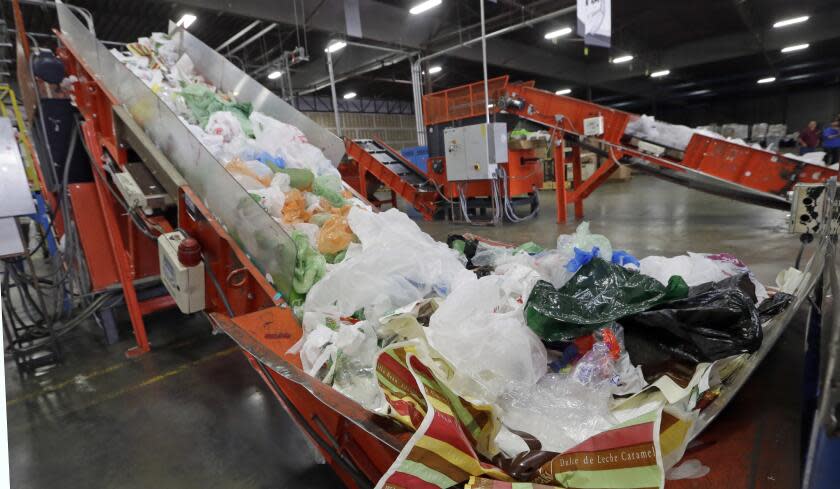Letters to the Editor: Is choking the planet worth the convenience of a flimsy plastic bag?

To the editor: In the various Faust legends, Dr. Faustus is an old scholar who made a demonic pact to sell his soul in exchange for unlimited knowledge and the sensual pleasures of youth. Thus, the proverbial Faustian bargain, which can be characterized as doing something for present gain without considering its future consequences. ("California’s plastic bag ban is failing. Here’s why," Aug. 24)
It seems that humanity made a Faustian bargain with a chemical demon known as plastic. Is the damage that demon has inflicted on our planet worth the convenience?
All we need to convince us that plastic is like a monstrous serpent that will continue to strangle us, is to glance at photos that show placid streams clogged by plastic waste and beautiful marine life choked by the tons of plastic in the oceans.
As his death approached, Dr. Faustus attempted to build an ideal society to justify his existence, but his plan failed. Nevertheless, he is rescued from eternal damnation by a choir of angels who speak the motto, "He who exerts himself in constant striving, him we can save."
To save our Earth from excessive plastic, we must exert ourselves in constant striving to rid our habitat of that abomination.
David Quintero, Monrovia
..
To the editor: Here are two reasons the state's ban on single-use plastic grocery bags is failing.
First, except for a handful of ardent environmentalists, no one living in Los Angeles gives a darn about plastic bags. Trying to control them is just another imposition by the Legislature on our enjoyment of life.
Second, we're just plain tired of going to the grocery store and spending $293 for a basket full of food, only to find that we need one more bag in addition to the five reusable ones we brought, and the cashier asks us, "Would you like another bag for 10 cents?"
For 10 cents, the environment can go to hell.
Robert M. Rosenthal, Burbank
..
To the editor: We should know by now that it is ineffective and unfair to rely entirely on consumers to solve our fossil fuel pollution problems. This is true in so many realms, including automobile and air travel, home appliances and, as reporter Jessica Roy reminds us, single-use plastics.
For years we have been expected to carry reusable water bottles, reject plastic straws and recycle our plastic bags. Now Roy demonstrates that recycling single-use plastic is really just wishful thinking.
Hasn't the time come to move upstream and attack the problem at its source, the manufacturing? A federal price on carbon would increase the cost of single-use plastics by making their raw materials more expensive, discouraging their proliferation.
Or, California could simply ban plastic bags outright.
Peggy Painton, Los Angeles
..
To the editor: Retailers must stop automatically shoving every purchase into a plastic bag, whether the customer wants it or not. I inevitably have to say, "I don’t need a bag" as the cashier is packing up an item I'm going to put in my car or consume within minutes.
And now I must say this to another service provider, the Los Angeles Times: I don't need a bag for my newspaper.
Every day, my paper comes in a tiny, non-reusable plastic bag that is destined for the landfill. I’d like to see The Times set a better example.
Mary Jack, Venice
This story originally appeared in Los Angeles Times.

